Uniform
The BJJFP utilizes uniform requirement to help make competition fair and safe for all athletes.
The BJJFP regulations on uniforms can be found in the BJJFP Rulebook: Rules & Regulation Article 35.1- 35.13
If a competitor does not meet any of the standards for equipment or uniform, he/she will be given 5 minutes to change. If the competitor cannot meet the equipment and uniform standards within those 5 minutes, they will be disqualified.
The competitor must wear under garments under shorts or pants, due to the risk that the suit might become torn or undone. In the case that pants are torn, the competitor will be given 5 minutes to find another pair of pants to wear. If the competitor cannot change within 5 minutes, he/she will be immediately disqualified.
When the competitor has any part of the uniform ripped during the competition, the referee will allow 5 minutes for that competitor to get changed. The competitor must be cleared by the uniform inspector prior to returning to the mat area. If the competitor cannot change within 5 minutes, he/she will be immediately disqualified.
Competitors must compete in the uniform they wore when they weighed in. Should the competitor weigh in with one uniform and then change into another before their first competition or between their competitions, he/she will be disqualified.
Wrestling shoes, or any shoes, socks, cups and headgear will not be permitted. Any brace or piece of protective equipment that may alter the outcome of the match may not be worn. This includes, but is not limited to, braces with metal parts and supports that provide extra grip against the mat.
Uniforms, both in GI and No GI, may not have patches and/or text in any form that contain phrases, symbols, or slogans that are offensive to gender, culture, race, sexual orientation, religion, and/or political ideologies or that promote violence, sexual acts, drugs, alcohol and/or tobacco. It is required that all competitors wear shoes, sandals, or slippers when off the competition area to avoid feet injury and/or germs on the mat area.
In order to standardize uniforms in competition, general guidelines are as follows:
- All male competitors are allowed to wear rash guards only underneath the GI.
- All female competitors are not allowed to wear t-shirts, tank tops or any cotton material undergarment and are required to wear rash guards, sports bras, or an equivalent lycra garment underneath their GI. Female under garments should not be sexually explicit or provocative.
Female athlete are permitted to cover their heads. The Head Cover requirements are as follows:
- Must be fixed and made with elastic fabric(or have elastics at the borders);
- Be made without any kind of plastic or hard materials;
- Be made with no strings of any kind;
- Be clear of any inscription or logo;
- Must be completely in black color;
- The head covering can be made of elastic material, must be fully black in color and can cover the neck, ears and hair, like a wetsuit headpiece. The face must remain fully visible.
Uniform regulations for GI competition are as follows:
- GIs are to be constructed of cotton or similar material and in good condition. The material may not be excessively thick or stiff to the point where it hinders the opponent from executing a submission. The GI top must be made of single weave, gold weave, double weave or a similar weight material.
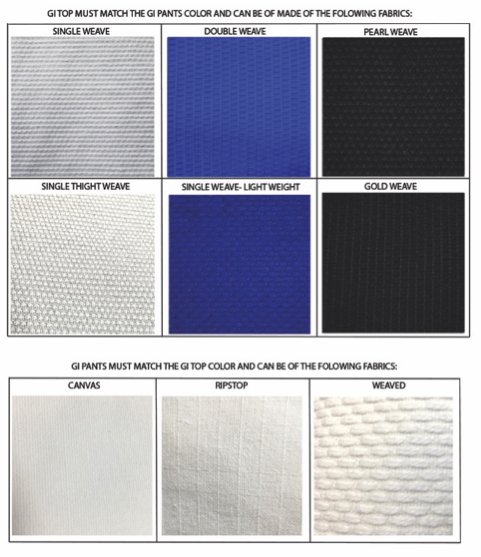
- Colors may be black, white or royal blue. No combined colors will be allowed (e.g. white gi with blue pants or a white gi with black lapels).
- The jacket and the trousers should be of a uniform color and correspond to the following color references:
- White: Snow white reference.
- Blue: maximum Pantone color: 285M 5M minimum Pantone color: 286M.
- Black: maximum Pantone color: 050505M minimum Pantone color: 2 323233M.
- The jacket is to be of sufficient length, down to the pelvis.
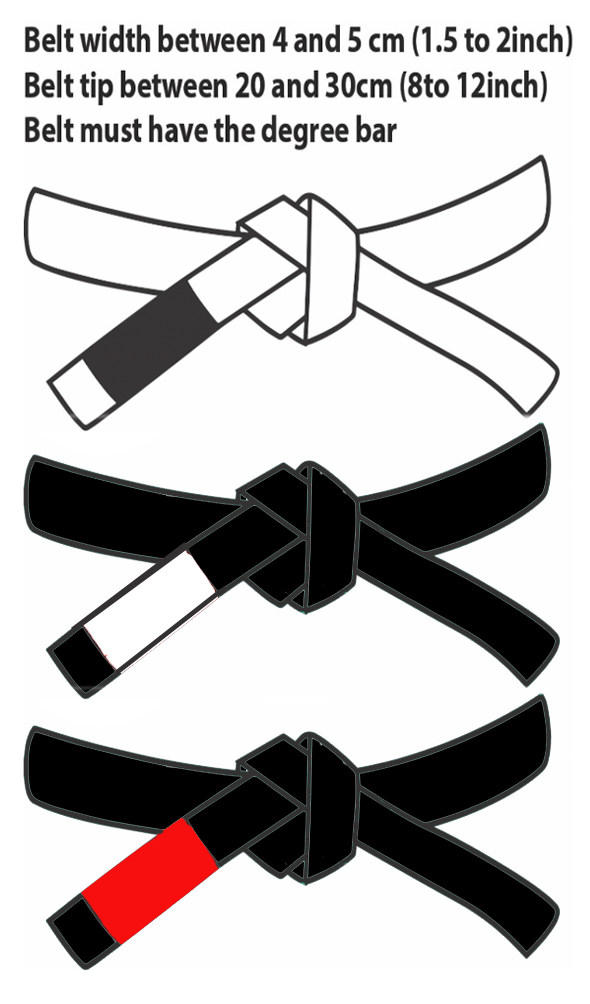
- The sleeves must reach a point no more than 5cm back from the wrist when the arms are extended in front of the body.
- When the arms are held out to the sides, level to the shoulders, the material of the sleeves must have at least 7cm of slack along the length of the arm.
- The lapel of the jacket must be 4-5cm wide and less than 1.3cm thick.
- A belt with width of 4-5cm and color corresponding to rank tied around the waist with a double knot, tight enough to secure the gi closed. The belt must have the degree bar.
- The pants are to be tied securely at the waist above the buttocks. If they are grabbed and pulled down, they should remain affixed where they are secured at the waist. They must be of appropriate length, reaching a point no more than 8cm up from the ankle.
- When the athlete is standing, the material of the pants must have at least 5cm of slack along the length of the leg.
- Athletes are not permitted to compete with any part of the uniform torn.
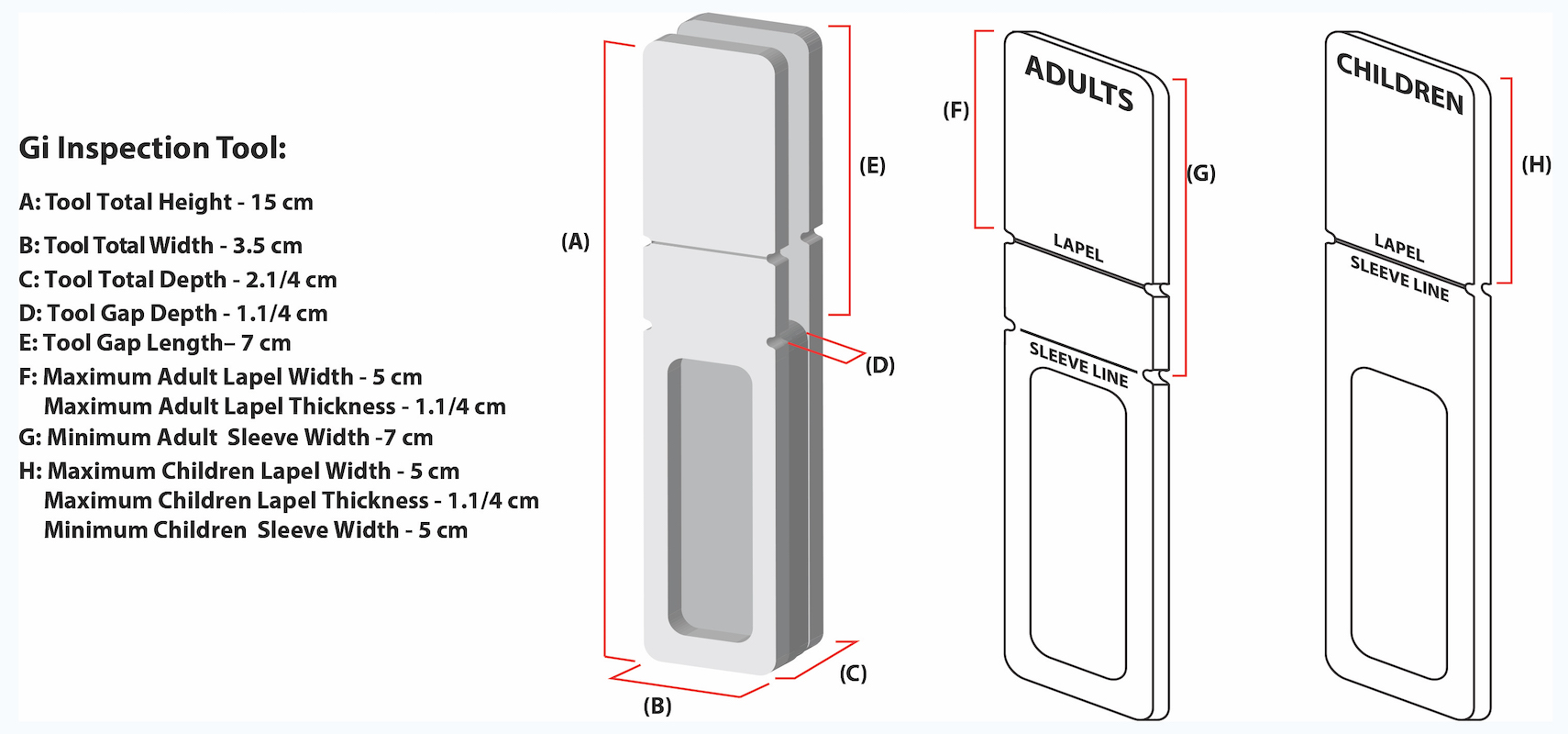
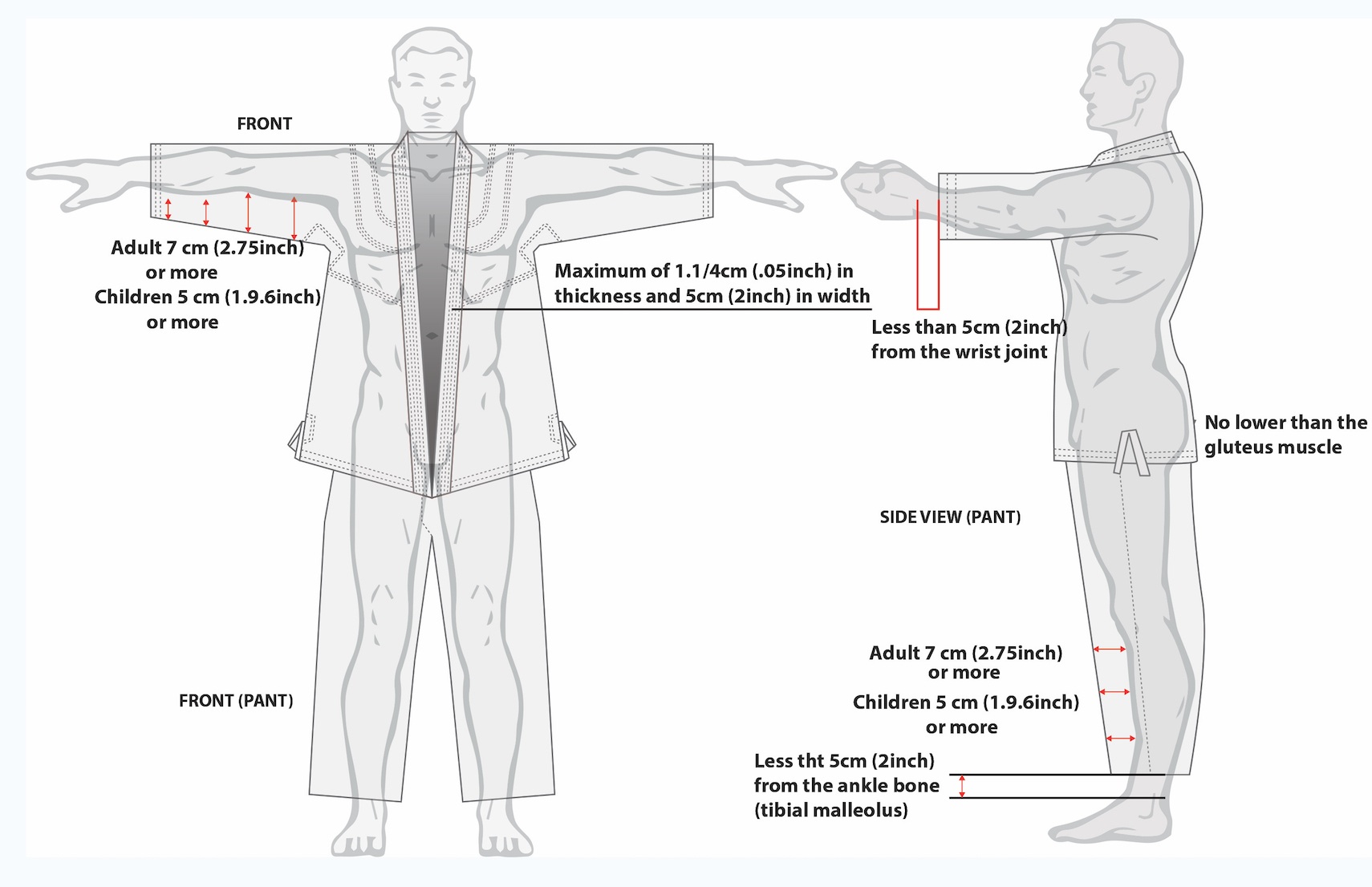
Patches and embroidery may be securely affixed only in prescribed areas on the gi that does not impede regular gripping of the GI. Any patches with unfixed edges or tears must be removed. Patch Regulations for the GI are as follows:

Uniform regulations for all No GI competition are as follows:
- Rash guard must be fitted and hug the body with a round collar (V-necks are not allowed).
- Rash guard may have short sleeves or long sleeves but it cannot be without sleeves.

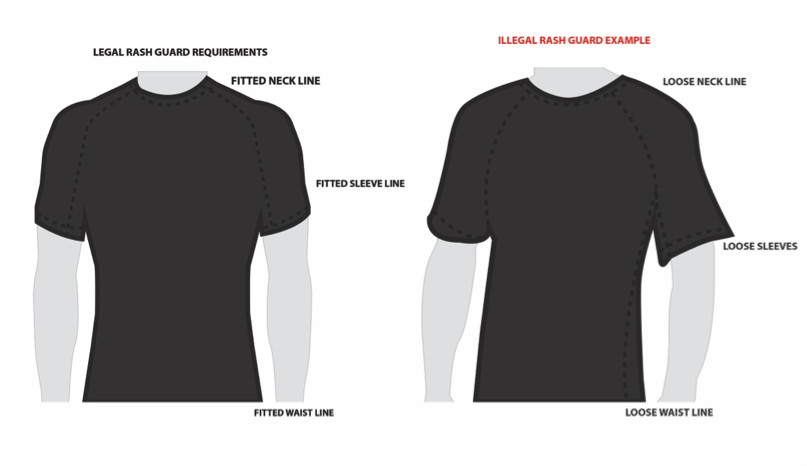
**Additional uniform regulations for Juvenile, Adult, and Master divisions during No GI competition for BJJFP World Jiu-Jitsu Championship: The rash guard (Lycra shirt) must be white or black with at least 10% of the color of the athlete’s belt rank. Rash guards that are 100% the color of the belt rank of the athlete are also acceptable.**
- The shorts can be of any color, they must be free of zippers and pockets.
- The shorts must be proper secured to avoid exposure.
- Shorts may be a loose board-like short or tight like vale-tudo shorts as long as they are at least mid thigh length.
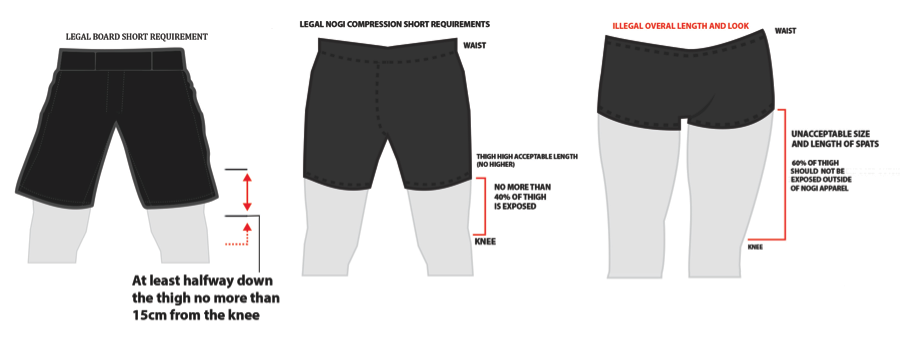
- Lycra pants may pass the knee, but not the ankle, and cannot be a loose fit.
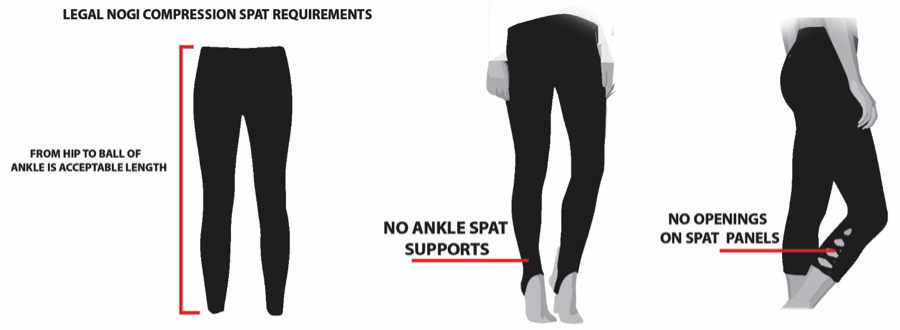
- Athletes must choose to compete in shorts or lycra pants, or both.
- The shorts are to be tied securely at the waist, above the buttocks. If they are grabbed and pulled down, they should remain affixed where they are secured at the waist.
- Athletes are not permitted to compete with torn shorts or torn rash guards.
- Patches and embroidery may be securely affixed in any place on the shorts or rash guard. Any patches with unfixed edges or tears must be removed.
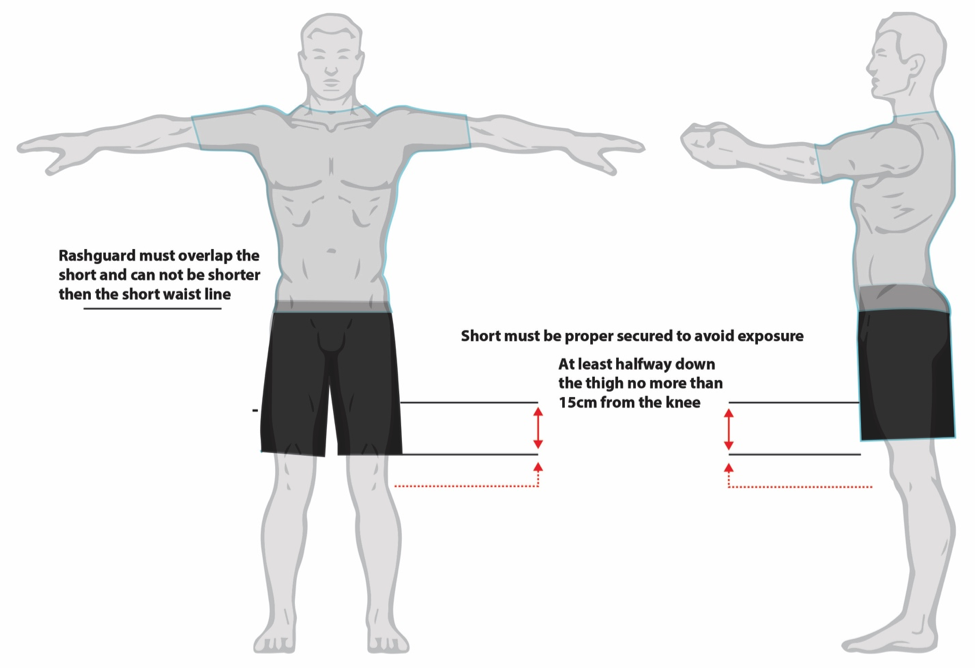
Hygiene Requirements
Competitors must meet the following regulations or they may be disqualified.
- Their uniform must be washed, dry, and free of unpleasant odor.
- Competitors’ toenails and fingernails must be kept short, clean and free from sharp edges or jaggedness.
- Individuals with long hair must secure it so that it will not interfere with their performance or that of their opponent during a match.
- Competitors may not use makeup, hair spray/dye, or any other substance that will come off onto their own gi, the mats or onto their opponent.
- Any individual with a transmittable disease, viral, bacterial or fungal, will not be allowed to compete. An individual with an uncovered cut, sore, rash, wound or lesion will not be allowed to compete. Individuals with cuts, sores, rashes, wounds or lesions that are bandaged may be allowed to compete at the discretion of the medic and tournament officials.


